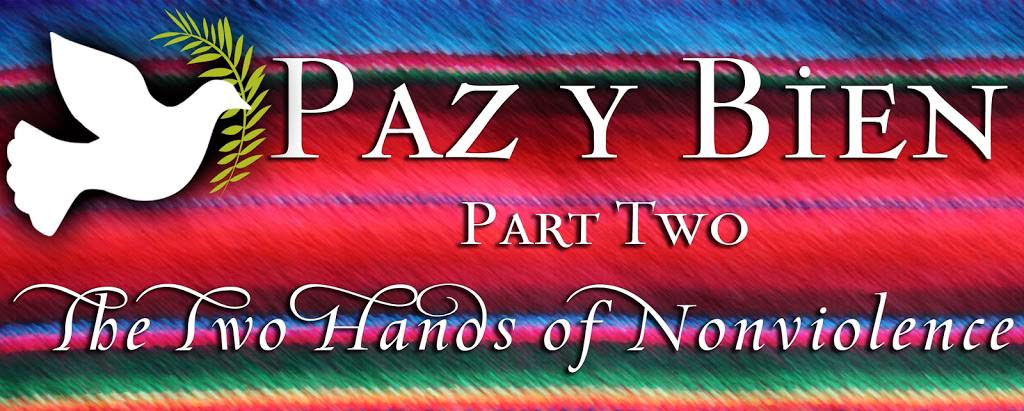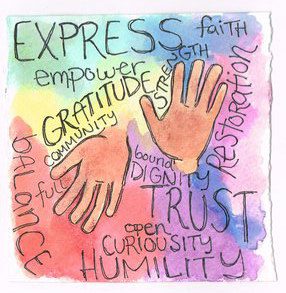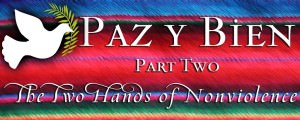Paz y Bien Part 2: A Posture of Nonviolence and Balance

The second part of the Paz y Bien nonviolence series by lay missioner Annemarie Barrett:
“With one hand we say to one who is angry, or to an oppressor, or to an unjust system, ‘Stop what you are doing. I refuse to honor the role you are choosing to play. I refuse to obey you. I refuse to cooperate with your demands’ (Engage, page 58).”
“But then the advocate of nonviolence raises the other hand. It is raised out-stretched maybe with love and sympathy, maybe not-but always outstretched… With this hand we say, ‘I won’t let go of you or cast you out of the human race. I have faith that you can make a better choice than you are making now, and I’ll be here when you are ready. Like it or not, we are part of one another’ (Engage, page 58).”
These two excerpts from Engage: Exploring Nonviolent Living a project of Pace e Bene Nonviolence Service explain the message behind one of my favorite tools from the nonviolence workshops that we have been offering in communities here in Cochabamba over the last few months.
The tool is called the Two Hands of Nonviolence and it is a posture that expresses a nonviolent response to violence and injustice. The essence of this posture is balance.
We introduce this tool in the workshops after discussing together our common reactions in moments of conflicts.
 |
| Artwork Annemarie made while reflecting on the Two Hands of Nonviolence |
We acknowledge together that many of us avoid violence and conflict. We try not to get involved. We let someone else deal with it. We do not believe we have the power to change anything.
Other times we accommodate the violence and conflict. We accept it as a part of our reality. We convince ourselves that it is not all that bad. We refuse to rock the boat for fear that we would only make the situation worse.
And other times we respond to violence with more violence. We prefer to take the offensive and try to gain power and control. We believe we are justified in taking “an eye for an eye.”
Personally, I know that I have responded to conflicts with each of these reactions and for a variety of reasons. But I also know that not one of them feels as powerful and centered to me as the balance of the Two Hands of Nonviolence.
As I often explain in the workshops, in my own life, I sometimes weigh too heavily on the outstretched hand, losing my balance and letting others walk all over me. Other times, I weigh too heavily on the hand making a “stop sign” out in front of me, losing my balance and refusing, either silently or with words, to acknowledge the other person’s humanity in the midst of the conflict.
Neither imbalance serves me well. So I try to meditate on the Two Hands of Nonviolence, even if just for a moment, when working through the daily conflicts I encounter.
I invite you to do the same. Can you recall times in your own life when you have reacted by avoiding, accommodating or countering violence with more violence? Which reaction do you think you use most often?
Now I invite you to imagine a conflict in your own life and then recall the Two Hands of Nonviolence, actually hold them up in front of you. With one hand firmly make a “stop sign,” say, “I will not cooperate with your violence or injustice; I will resist it with every fiber of my being.” And with the other hand, outstretched and open, ready to receive, say, “I am open to you as a human being (Engage, page 57).”
Can you feel the balance? Can you feel the power?
Having known what a difference this tool has made in my own life, it has been an incredible gift to share it with communities here in Cochabamba so that together we can explore the transformative power of creative nonviolence.
Next week my third post in the Paz y Bien series will share what it means to me to engage the ministry of facilitation as a Franciscan
Tagged in:

